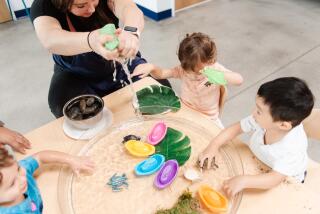Study Links Good Day Care to Readiness for School
WASHINGTON — A new study to gauge the effects of day care centers has found that for all children--particularly those most at risk of academic failure--good day care boosts school performance into second grade.
Conversely, the debilitating effects of poor day care--defined as everything from centers with safety hazards to even caregivers who suffer depression--also persisted into the crucial first years of a child’s school experience, researchers said.
Four years after the widely cited “Cost, Quality and Outcomes Study” of day care centers, leading academics revisited 800 students as they were finishing the second grade. Their findings, released Tuesday, offer the first large-scale evidence that when it comes to day care, quality counts.
By the end of the second grade, researchers found, children from day care classes with good teaching practices had significantly better language and math skills than those from mediocre centers.
Children who had close relationships with their caregivers were found to have fewer behavior problems and better social skills as well as higher academic scores than their less fortunate counterparts.
In the survey four years ago, researchers studied a random sample of 401 full-day child care centers in Los Angeles, central Colorado, Connecticut and central North Carolina, discovering that fewer than a quarter of them delivered high-quality care--and more than 11% were substandard.
“If America wants all its children to be ready for school, it must improve the child care experience available to children in this country,” said Richard Clifford of the University of North Carolina, one of the study’s lead authors.
The researchers, all specialists in early childhood development and education, said that the lasting impact of these influences is significant.
“Children who have good relationships with child care teachers leave child care expecting to have a positive relationship with their school teacher,” said Carollee Howes, a developmental psychologist at UCLA.
Researchers said children who experienced quality day care had good outcomes compared to those who did not--regardless of their family’s incomes, their racial or ethnic groups or the time that they have spent in day care. But, they said, they were struck by the magnified effect that day care’s quality had on the later school performance of children whose mothers had the lowest levels of education.
Children whose mothers had not finished high school were “more sensitive to low-quality care and responded more to good-quality care” than any other group, Howes said.







